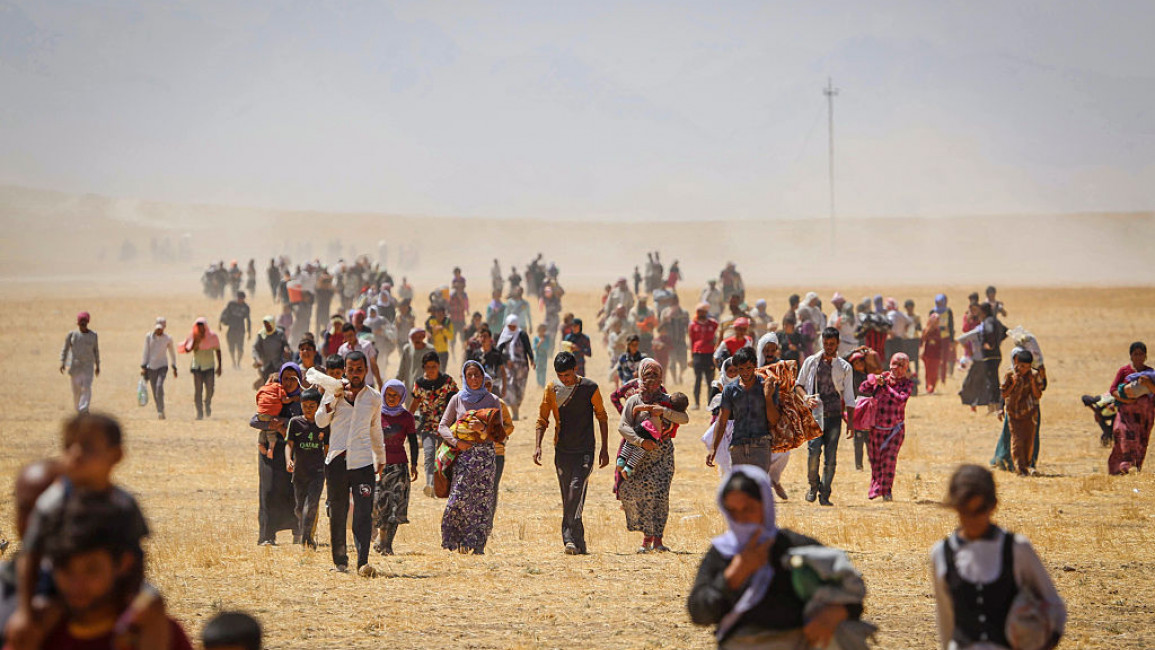Iraq's Yazidis, victims of genocide
The Yazidis, which a German court found to be victims of genocide in a historic first on Tuesday, are a Kurdish-speaking ethno-religious minority.
Islamic State jihadists carried out a horrific massacre of the community in northwestern Iraq in August 2014, killing men en masse and abducting thousands of girls and women as sex slaves.
Mainly living in remote corners of the north of Iraq, the Yazidis are followers of an ancient and unique religion.
Their faith emerged in Iran more than 4,000 years ago and is rooted in Zoroastrianism. Over time it has also absorbed elements of Islam and Christianity.
Organised into castes, and with no holy book, Yazidis pray to God facing the sun and worship his seven angels - first and foremost Melek Taus, or Peacock Angel.
Their holiest site is Lalish, a serene stone complex of shrines and natural springs in Iraq's mountainous northwest where visitors must walk barefoot.
The faith is led by a five-member High Spiritual Council based in nearby Sheikhan, which includes both the worldwide "prince" of Yazidis and Baba Sheikh, their religious chief.
Yazidis discourage marriage outside of their community and even across their caste system.
Their usual beliefs and practices, such as a ban on eating lettuce and wearing the colour blue, have often been seen by other Iraqis as satanic.
Yazidis are organised into three castes - sheikhs, pirs, and murids - and cannot wed across them or outside the sect. Children are Yazidi only if both their parents are.
Of the world's nearly 1.5 million Yazidis, the largest number - 550,000 - lived in Iraq before being scattered by the IS offensive in 2014.
But since IS swept across Sinjar in 2014, around 100,000 have fled to Europe, the US, Australia and Canada.
Among the Yazidis who have found refuge in Germany are 2018 Nobel Peace Prize winner Nadia Murad who was captured, raped and forced to marry a jihadist before she was able to escape.
With the Lebanese-British lawyer Amal Clooney, Murad has been fighting for the IS to be put on trial for their crimes.
Only a few thousand Yazidis have been able to return home to Mount Sinjar.
Their status as non-Arabs and non-Muslims has placed Yazidis among the most vulnerable minorities in the Middle East, where orthodox Muslims have often derided them as "devil-worshippers".
Yazidis say they have been subject to 74 "genocides", including the IS attack in 2014.
One of the worst, according to the High Spiritual Council, saw 250,000 Yazidis perish several hundred years ago.
They were also persecuted by the Ottoman Empire in the early 1900s and more recently by Iraqi dictator Saddam Hussein, whose iron-fisted rule between 1979 and 2003 forced thousands of Yazidi families to flee.
The Iraqi Constitution of 2005 recognised the Yazidi right to practise their religion and gave them seats in the central and autonomous Kurdish parliaments.
The Islamic State seized the Yazidi bastion Sinjar in August 2014, unleashing a brutal campaign that the United Nations has said could amount to genocide.
According to religious authorities, more than 1,280 Yazidis were killed by IS, leaving several hundred children orphaned. Nearly 70 shrines were destroyed.
Several dozen grave sites have been identified across Sinjar containing the remains of IS victims.
Some women who had been forced to bear the children of IS fighters have left them in neighbouring Syria, as they would not have been accepted by the minority.
In May, a special UN team said it had "clear and convincing proof" of a genocide.
A court in Frankfurt on Tuesday jailed an Iraqi IS member to life in prison for war crimes against the Yazidis, finding him guilty of genocide.



